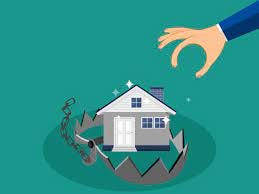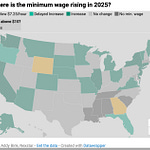If you can afford it and are in the mood, why not…
“Pain is always a form of motivation,” the training manual reads. “Once you find the Seller’s pain, you have a much better chance of buying the house.” ProPublica article, May 11, 2023, documenting its investigation into “We Buy Ugly Houses” and its corporate owner, HomeVesters of America
I’ve written about predatory business practices several times before on Crime and Punishment, but usually focused on the companies that lend money, like Pay Day lenders as one example. Their business model targets the poor who are more likely to be in vulnerable social and financial situations, and because of low credit scores and lack of higher paying jobs, cannot borrow from a more closely regulated institution. This population is desperate for cash or credit, lenders know it and prey on them and their communities.
Predatory practices are baked into an unscrupulous company’s culture and literally taught to its employees, and in the case of HomeVesters, the target of the ProPublica investigation above, its franchisees. Of course, these practices are never discussed or admitted to publicly, because the companies are savvy enough to put a legitimate face on their business operations, and for good reason: these practices, either individually or taken together, can amount to fraud.
The Consumer Financial Protection Bureau (CFPB) was created in 2010 via the Dodd-Frank Act passed as part of the government response to the financial crisis. Since its inception, the CFPB has compiled this record:
3.9 million+ consumer complaints received responses
$17.5 billion in financial relief as a result of CFPB actions
200 million people eligible for financial relief
Yet this is the federal agency, along with the U.S. EPA, that some elected officials want to dismantle and defund. Protecting consumers and the environment—gone.
Earlier this year, the CFPB issued a detailed policy describing what it considers abusive and illegal practices by financial institutions that result in an unfair advantage to the seller and negative consequences to the purchaser. The policy intends to put both the regulated community and consumers on notice— specifying what business practices to avoid, and what tactics should trigger suspicion for a consumer. Although the CFPB banned “abusive” practices in the financial industry shortly after it was founded, this new policy details what it considers illegal, abusive practices and establishes a more detailed framework for federal and state regulators to enforce violations.
…the CFPB sets forth how abusive conduct generally includes (1) obscuring important features of a product or service or (2) leveraging certain circumstances—including gaps in understanding, unequal bargaining power, or consumer reliance—to take unreasonable advantage [of consumers].
It is unclear if these prohibitions on illegal, abusive tactics by financial institutions apply to companies like HomeVestors of America, unless the homeowner or family member can prove separately that specific practices amounted to elder abuse or fraud, which are crimes distinct from the illegal practices described by the CFPB’s new policy. In a separate article investigating the legal options for consumers subject to high pressure, real estate sales tactics, ProPublica concludes:
Because homeowners are being pressured to sell rather than to buy something, the laws don’t cover them as consumers…
“The harm is the same, though: Parties with unequal bargaining power are engaging in a transaction, and the less sophisticated party loses,” Dugan said. [Kate Dugan is a staff attorney at Community Legal Services in Philadelphia, who worked on a novel city law to regulate real estate “wholesalers”].
When you read the individual stories of some of the victims of the home buyer, HomeVesters of America, as unearthed in a series of articles by ProPublica, you will understand why the word “abusive” is used to describe the tenets of this business model.
First, these businesses target the elderly, the poor and those living alone—typically the most vulnerable to scams. According to interviews with HomeVestors’ franchisees and references in its training manuals, their employees are directed to scope out poor neighborhoods and those nearby to nursing homes and rehabilitation facilities for signs of illness or financial distress, like utility shut-off or eviction notices, even belongings piled outside a home. They also research public records to find those who have lost a spouse to death or divorce. Then these prospective buyers contact this most vulnerable population relentlessly, with letters, mailers and calls and visits to their homes.
If they close on a sales contract (typically for 2/3 or less of the listed value of the home), and the seller, or more often the seller’s family try to cancel the contract, the franchise often files a notice of a legal dispute against the title that effectively prohibits the seller from transferring the property to someone else (called “clouding the title), and also files a lawsuit for breach of contract in court.
Real estate experts, however, say HomeVestors franchisees’ large volume of lawsuits and title notices is not only indicative of a predatory business practice, it’s a tacit acknowledgment that sellers often later learn of better options.
I love the kind of reporting that good journalism fosters and expects, and many of ProBublica’s deep dives into a company’s fraudulent behavior, for example, can make a real difference in people’s lives. And it spurs Congress and state and local legislatures to enact broader consumer protection laws, and close any glaring loopholes in existing laws.
But as we know, heavy-handed sales tactics have been around probably as long as humans grunted their way into communication, and the concept of property of any kind existed.
In the mid-1980’s (perhaps the Stone Age for some), and shortly after I graduated law school and was working as an attorney for the Ohio EPA, my widowed mother called me to let me know she had signed a contract for the sale of our family home. By this time, I was aware that she had at least one mini-stroke (TIA), perhaps attributable to an adjustment of her blood pressure medication, and had stopped driving, but I didn’t realize her cognitive abilities had been impaired. When she told me about the circumstances leading to the sale and then saw the contract “her attorney” had let her sign, I was livid. As I recall, it was some sort of a land contract where she didn’t receive any money up front, and it was stuffed with contingencies as to when she would actually receive any money from the alleged sale.
The contract was technically legal, but unconscionable, and the worst possible deal for the seller. Worse, she had been talked into it by her “friend”, a man whose name she was familiar with, and who had driven her places when he saw her walking by herself—and he mentioned he was working with her attorney and interested in buying her house.
I’m sure she was lonely enough to talk to this man and discuss how her husband died unexpectedly, etc., and about her health woes, making her even more vulnerable to his predatory tactics. My mother was a born and bred New Yorker who had always been savvy enough to avoid this B.S., but not after she had strokes and resulting dementia.
I contacted her attorney and he balked at letting her out of the contract, claiming like the fraudulent home buyers in the ProPublica investigation, that he thought her cognitive abilities were just fine and she was of “sound mind” when she signed the contract. I won’t describe exactly how I let loose on this unethical attorney, but suffice it to say I threatened to “sue his ass off” if he did not let her out of the contract. He did relent, and I paid the termination fee specified in the contract, which I should not have had to do given the highly unethical, unconscionable terms of the sale.
This scenario that happened over 40 years ago almost exactly replicates the predatory tactics used by HomeVestors and other companies in today’s home buying business. Only now it’s a pervasive, national scheme to prey on the vulnerable, rather than individuals with a bit of leverage in cahoots to defraud a few people in their community.
—————————————————————————————————————
Have you had an experience similar to mine and/or the schemes uncovered in the ProPublica articles? What should be done to prevent these unethical and potentially illegal business tactics? I’d love to hear your take on this! Feel free to leave your thoughts in the Comment Section below.
If you are not already a subscriber, why not take this opportunity to join our community with a free or paid subscription? A new paid subscription or an upgrade from a free to paid subscription will allow me to expand this newsletter with additional, primary source information, like interviews and public information requests, and expanded podcast offerings to include real, live guests. Although I won’t be going on strike any time soon, the current TV writer’s strike demonstrates that writers deserve to be paid, and paid well for their work, just like any other profession. Thank you in advance for your financial support of my writing!














Share this post